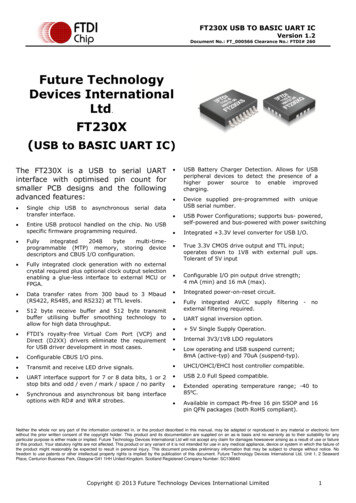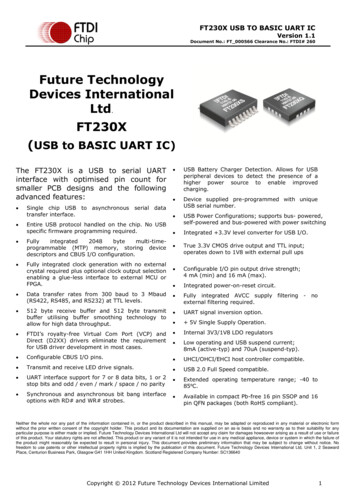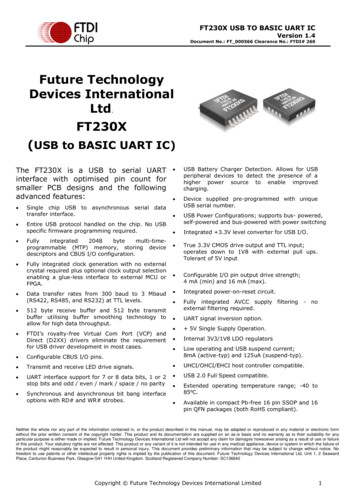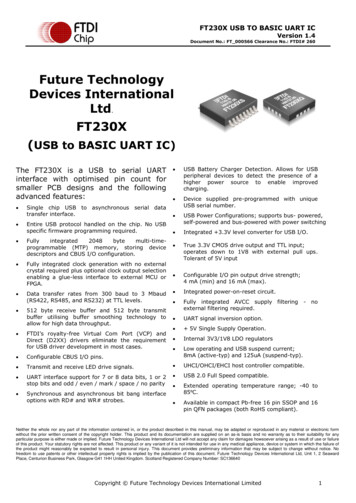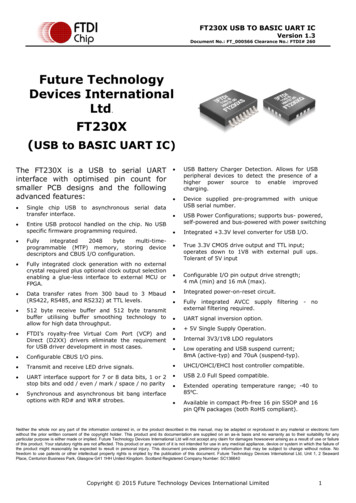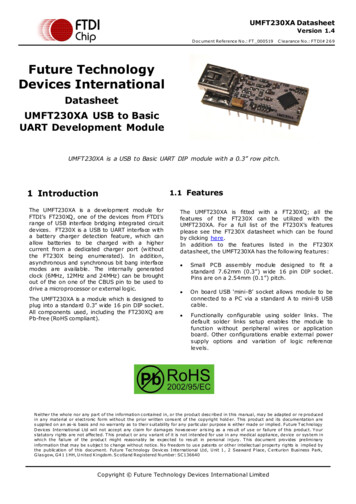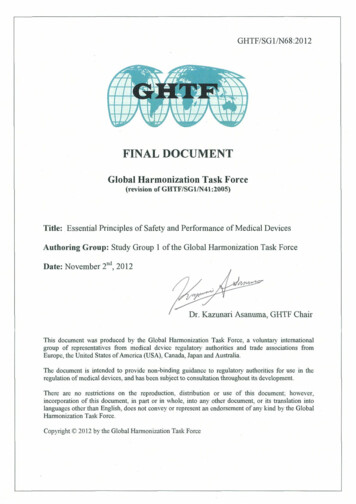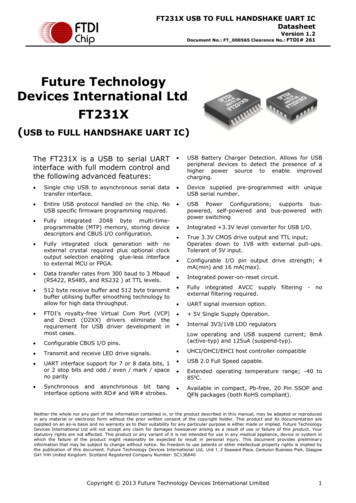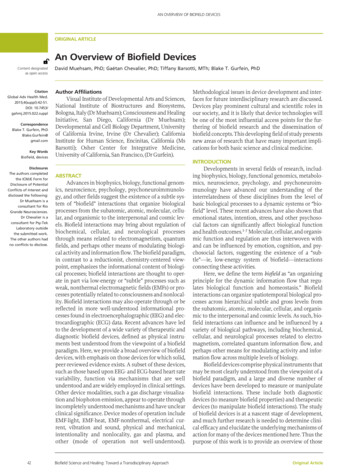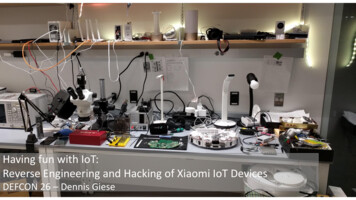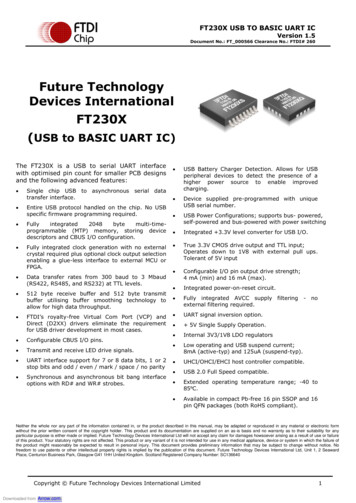
Transcription
FT230X USB TO BASIC UART ICVersion 1.5Document No.: FT 000566 Clearance No.: FTDI# 260Future TechnologyDevices InternationalFT230X(USB to BASIC UART IC)The FT230X is a USB to serial UART interfacewith optimised pin count for smaller PCB designsand the following advanced features: Single chip USB to asynchronous serial datatransfer interface.USB Battery Charger Detection. Allows for USBperipheral devices to detect the presence of ahigher power source to enable improvedcharging. Entire USB protocol handled on the chip. No USBspecific firmware programming required.Device supplied pre-programmed with uniqueUSB serial number. USB Power Configurations; supports bus- powered,self-powered and bus-powered with power switching Integrated 3.3V level converter for USB I/O. True 3.3V CMOS drive output and TTL input;Operates down to 1V8 with external pull ups.Tolerant of 5V input Configurable I/O pin output drive strength;4 mA (min) and 16 mA (max). Integrated power-on-reset circuit. Fully integrated AVCC supply filteringexternal filtering required. UART signal inversion option. 5V Single Supply Operation. Internal 3V3/1V8 LDO regulators Low operating and USB suspend current;8mA (active-typ) and 125uA grammable (MTP) memory, storing devicedescriptors and CBUS I/O configuration. Fully integrated clock generation with no externalcrystal required plus optional clock output selectionenabling a glue-less interface to external MCU orFPGA. Data transfer rates from 300 baud to 3 Mbaud(RS422, RS485, and RS232) at TTL levels. 512 byte receive buffer and 512 byte transmitbuffer utilising buffer smoothing technology toallow for high data throughput. FTDI’s royalty-free Virtual Com Port (VCP) andDirect (D2XX) drivers eliminate the requirementfor USB driver development in most cases.- no Configurable CBUS I/O pins. Transmit and receive LED drive signals. UART interface support for 7 or 8 data bits, 1 or 2stop bits and odd / even / mark / space / no parity UHCI/OHCI/EHCI host controller compatible. Synchronous and asynchronous bit bang interfaceoptions with RD# and WR# strobes. USB 2.0 Full Speed compatible. Extended operating temperature range; -40 to85⁰C. Available in compact Pb-free 16 pin SSOP and 16pin QFN packages (both RoHS compliant).Neither the whole nor any part of the information contained in, or the product described in this manual, may be adapted or reproduced in any material or electronic formwithout the prior written consent of the copyright holder. This product and its documentation are supplied on an as-is basis and no warranty as to their suitability for anyparticular purpose is either made or implied. Future Technology Devices International Ltd will not accept any claim for damages howsoever arising as a result of use or failureof this product. Your statutory rights are not affected. This product or any variant of it is not intended for use in any medical appliance, device or system in which the failure ofthe product might reasonably be expected to result in personal injury. This document provides preliminary information that may be subject to change without notice. Nofreedom to use patents or other intellectual property rights is implied by the publication of this document. Future Technology Devices International Ltd, Unit 1, 2 SeawardPlace, Centurion Business Park, Glasgow G41 1HH United Kingdom. Scotland Registered Company Number: SC136640Copyright Future Technology Devices International LimitedDownloaded from Arrow.com.1
FT230X USB TO BASIC UART ICVersion 1.5Document No.: FT 000566 Clearance No.: FTDI# 2601 Typical Applications USB to RS232/RS422/RS485 Converters USB Industrial Control Upgrading Legacy Peripherals to USB USB MP3 Player Interface Utilising USB to add system modularity USB FLASH Card Reader and Writers Incorporate USB interface to enable PCtransfers for development systemcommunication Set Top Box PC - USB interface USB Digital Camera Interface USB Hardware Modems USB Wireless Modems USB Bar Code Readers USB dongle implementations for Software/Hardware Encryption and Wireless Modules Detection of dedicated charging port for batterycharging at higher supply currents. Cellular and Cordless Phone USB data transfercables and interfaces Interfacing MCU/PLD/FPGA based designs toadd USB connectivity USB Audio and Low Bandwidth Video datatransfer USB Smart Card Readers USB Instrumentation1.1 Driver SupportRoyalty free VIRTUAL COM PORT(VCP) DRIVERS for.Royalty free D2XX Direct Drivers(USB Drivers DLL S/W Interface) Windows 10 32,64 bit Windows 10 32,64 bit Windows 8/8.1 32,64-bit Windows 8/8.1 32,64-bit Windows 7 32, 64-bit Windows 7 32,64-bit Windows Vista and Vista 64-bit Windows Vista and Vista 64-bit Windows XP and XP 64-bit Windows XP and XP 64-bit Server 2003, XP and Server 2008/2012 Server 2003, XP and Server 2008/2012 Windows XP Embedded Windows XP Embedded Windows CE 4.2-5.2, 6.0, 7.0, 2013 Windows CE 4.2-5.2, 6.0, 7.0, 2013 Mac OS-X Mac OS-X Linux 3.2 and greater Linux 2.6 and greater Android AndroidThe drivers listed above are all available to download for free from FTDI website (www.ftdichip.com).Various 3rd party drivers are also available for other operating systems - see FTDI website(www.ftdichip.com) for details.For driver installation, please refer to m1.2 Part NumbersPart NumberFT230XQ-xxxxFT230XS-xxxxPackage16 Pin QFN16 Pin SSOPNote: Packing codes for x is:- R: Taped and Reel, (SSOP is 3,000pcs per reel, QFN is 5,000pcs per reel).- U: Tube packing, 100pcs per tube (SSOP only)- T: Tray packing, 490pcs per tray (QFN only)For example: FT230XQ-R is 5,000pcs taped and reel packingCopyright Future Technology Devices International LimitedDownloaded from Arrow.com.2
FT230X USB TO BASIC UART ICVersion 1.5Document No.: FT 000566 Clearance No.: FTDI# 2601.3 USB CompliantThe FT230X is fully compliant with the USB 2.0 specification and has been given the USB-IF Test-ID (TID)40001463 (Rev D).Copyright Future Technology Devices International LimitedDownloaded from Arrow.com.3
FT230X USB TO BASIC UART ICVersion 1.5Document No.: FT 000566 Clearance No.: FTDI# 2602 FT230X Block DiagramVCC1V8 InternalCore Supply3V3OUTUSBDPUSBDM3.3 Volt LDORegulatorUSBTransceiverwithIntegrated1.5k pullupsand batterychargedetection48MHz1.8 Volt LDORegulatorFIFO RX Buffer(512 bytes)Baud RateGeneratorTXDRXDRTS#CTS#Serial InterfaceEngine(SIE)USBProtocol EngineUART FIFOControllerUART ControllerwithProgrammableSignal InversionCBUS0CBUS1CBUS2CBUS3Internal MTPMemoryUSB DPLLFIFO TX Buffer(512 bytes)Internal12MHzOscillator3V3OUTRESET#X4 ClockMultiplierResetGenerator48MHzTo USB Transceiver CellGNDFigure 2.1 FT230X Block DiagramFor a description of each function please refer to Section 4.Copyright Future Technology Devices International LimitedDownloaded from Arrow.com.4
FT230X USB TO BASIC UART ICVersion 1.5Document No.: FT 000566 Clearance No.: FTDI# 260Table of Contents1Typical Applications . 21.1Driver Support . 21.2Part Numbers. 21.3USB Compliant . 32FT230X Block Diagram . 43Device Pin Out and Signal Description . 73.116-LD QFN Package . 73.1.13.2QFN Package Pin-Out Description. 716-LD SSOP Package. 83.2.13.34SSOP Package Pin Out Description . 8CBUS Signal Options . 9Function Description. 114.1Key Features . 114.2Functional Block Descriptions . 115Devices Characteristics and Ratings . 145.1Absolute Maximum Ratings. 145.2ESD and Latch-up Specifications . 145.3DC Characteristics. 145.4MTP Memory Reliability Characteristics . 165.5Internal Clock Characteristics . 176USB Power Configurations . 186.1USB Bus Powered Configuration . 186.2Self Powered Configuration . 196.3USB Bus Powered with Power Switching Configuration . 207Application Examples . 217.1USB to RS232 Converter . 217.2USB to RS485 Coverter . 227.3USB to RS422 Converter . 237.4USB Battery Charging Detection . 247.5LED Interface . 278Internal MTP Memory Configuration . 298.1Default Values . 298.2Methods of Programming the MTP Memory . 308.2.18.3Programming the MTP memory over USB . 30Memory Map . 30Copyright Future Technology Devices International LimitedDownloaded from Arrow.com.5
FT230X USB TO BASIC UART ICVersion 1.5Document No.: FT 000566 Clearance No.: FTDI# 2609Package Parameters . 329.1SSOP-16 Package Mechanical Dimensions . 329.2SSOP-16 Package Markings . 339.3QFN-16 Package Mechanical Dimensions . 349.4QFN-16 Package Markings . 359.5Solder Reflow Profile . 3610Contact Information . 37Document References . 38Acronyms and Abbreviations . 38Appendix B - List of Figures and Tables . 39Appendix C - Revision History . 40Copyright Future Technology Devices International LimitedDownloaded from Arrow.com.6
FT230X USB TO BASIC UART ICVersion 1.5Document No.: FT 000566 Clearance No.: FTDI# 2603 Device Pin Out and Signal Description76VCCIO3V3OUTVCC81103.1 16-LD QFN NDGNDUSBDMUSBDP152164TXDRXDRTS#CTS#Figure 3.1 QFN Schematic Symbol3.1.1 QFN Package Pin-Out DescriptionNote: # denotes an active low signal.Pin Input8**3V3OUTPOWEROutput3V3 output at 50mA. May be used to power VCCIO.When VCC is 3V3; pin 8 is an input pin and should beconnected to pin 10.3, 13, 17*GNDPOWERInput0V Ground input.5 V (or 3V3) supply to IC1V8 - 3V3 supply for the IO cellsTable 3.1 Power and Ground*Pin 17 is the centre pad under the IC. Connect to GND.** If VCC is 3V3 then 3V3OUT must also be driven with 3V3 inputPin No.NameTypeDescription7USBDMINPUTUSB Data Signal Minus.6USBDPINPUTUSB Data Signal Plus.9RESET#INPUTReset input (active low).Table 3.2 Common Function pinsCopyright Future Technology Devices International LimitedDownloaded from Arrow.com.7
FT230X USB TO BASIC UART ICVersion 1.5Document No.: FT 000566 Clearance No.: FTDI# 260Pin ionTransmit Asynchronous Data Output.Receiving Asynchronous Data Input.Request to Send Control Output / Handshake Signal.Clear To Send Control Input / Handshake Signal.Configurable CBUS I/O Pin. Function of this pin is configured in thedevice MTP memory. The default configuration is TXDEN. See CBUSSignal Options, Table 3.7.Configurable CBUS I/O Pin. Function of this pin is configured in thedevice MTP memory. The default configuration is RXLED#. See CBUSSignal Options, Table 3.7.Configurable CBUS I/O Pin. Function of this pin is configured in thedevice MTP memory. The default configuration is TXLED#. See CBUSSignal Options, Table 3.7.Configurable CBUS I/O Pin. Function of this pin is configured in thedevice MTP memory. The default configuration is SLEEP#. See CBUSSignal Options, Table 3.7.Table 3.3 UART Interface and CBUS GroupNote:When used in Input Mode, the input pins are pulled to VCCIO via internal 75kΩ (approx.) resistors. Thesepins can be programmed to gently pull low during USB suspend (PWREN# “1”) by setting an option inthe MTP CU?10123.2 16-LD SSOP 16FT230XSFigure 3.2 SSOP Schematic Symbol3.2.1 SSOP Package Pin Out DescriptionNote: # denotes an active low signal.Pin 3OUTPOWEROutputDescription5 V (or 3V3) supply to IC1V8 - 3V3 supply for the IO cells3V3 output at 50mA. May be used to power VCCIO.When VCC is 3V3; pin 10 is an input pin and should beconnected to pin 12.POWER0V Ground input.InputTable 3.4 Power and Ground** If VCC is 3V3 then 3V3OUT must also be driven with 3V3 input5, 13GNDCopyright Future Technology Devices International LimitedDownloaded from Arrow.com.8
FT230X USB TO BASIC UART ICVersion 1.5Document No.: FT 000566 Clearance No.: FTDI# 260Pin No.NameType9USBDMINPUTUSB Data Signal Minus.Description8USBDPINPUTUSB Data Signal Plus.11RESET#INPUTReset input (active low).Table 3.5 Common Function pinsPin nTransmit Asynchronous Data Output.Receiving Asynchronous Data Input.Request to Send Control Output / Handshake Signal.Clear To Send Control Input / Handshake Signal.Configurable CBUS I/O Pin. Function of this pin is configured in thedevice MTP memory. The default configuration is TXDEN. See CBUSSignal Options, Table 3.7.Configurable CBUS I/O Pin. Function of this pin is configured in thedevice MTP memory. The default configuration is RXLED#. See CBUSSignal Options, Table 3.7.Configurable CBUS I/O Pin. Function of this pin is configured in thedevice MTP memory. The default configuration is TXLED#. See CBUSSignal Options, Table 3.7.Configurable CBUS I/O Pin. Function of this pin is configured in thedevice MTP memory. The default configuration is SLEEP#. See CBUSSignal Options, Table 3.7.Table 3.6 UART Interface and CBUS GroupNotes:When used in Input Mode, the input pins are pulled to VCCIO via internal 75kΩ (approx.) resistors. Thesepins can be programmed to gently pull low during USB suspend (PWREN# “1”) by setting an option inthe MTP memory.3.3 CBUS Signal OptionsThe following options can be configured on the CBUS I/O pins. CBUS signal options are common to bothpackage versions of the FT230X. These options can be configured in the internal MTP memory using thesoftware utility FT PROG, which can be downloaded from the FTDI Utilities (www.ftdichip.com). Thedefault configuration is described in Section 8.CBUSSignalOptionTRI-STATEDRIVE 1DRIVE 0TXDENAvailable On CBUS #CBUS0, CBUS1, CBUS2, CBUS3TXLED#CBUS0, CBUS1, CBUS2, CBUS3RXLED#CBUS0, CBUS1, CBUS2, CBUS3TX&RXLED#CBUS0, CBUS1, CBUS2, CBUS3DescriptionIO Pad is tri-statedOutput a constant 1Output a constant 0Enable transmit data for RS485Output is low after the device has been configured byUSB, then high during USB suspend mode. This outputcan be used to control power to external logic PChannel logic level MOSFET switch. Enable theinterface pull-down option when using the PWREN# inthis way.Transmit data LED drive – pulses low when data isbeing received on the RxD pin of the UART andtransmitted over USB to the PC. See Section 7.5 formore details.Receive data LED drive – pulses low when data isbeing received from the host over USB andtransmitted on the TxD pin of the UART. See Section7.5 for more details.LED drive – pulses low when transmitting or receivingCopyright Future Technology Devices International LimitedDownloaded from Arrow.com.9
FT230X USB TO BASIC UART ICVersion 1.5Document No.: FT 000566 Clearance No.: FTDI# 260CBUSSignalOptionAvailable On CBUS PinSLEEP#CBUS0, CBUS1, CBUS2, CBUS3CLK24MHzCLK12MHzCLK6MHzCBUS0, CBUS1, CBUS2, CBUS3CBUS0, CBUS1, CBUS2, CBUS3CBUS0, CBUS1, CBUS2, CBUS3GPIOCBUS0, CBUS1, CBUS2, CBUS3BCD ChargerCBUS0, CBUS1, CBUS2, CBUS3BCDCharger#CBUS0, CBUS1, CBUS2, CBUS3BitBang WR#CBUS0, CBUS1, CBUS2, CBUS3BitBang RD#CBUS0, CBUS1, CBUS2, CBUS3VBUS SenseCBUS0, CBUS1, CBUS2, CBUS3Time StampCBUS0, CBUS1, CBUS2, CBUS3Keep Awake#Descriptiondata via USB. See Section 7.5 for more details.Goes low during USB suspend mode. Typically used topower down an external TTL to RS232 level converterIC in USB to RS232 converter designs.24 MHz Clock output.*12 MHz Clock output.*6 MHz Clock output.*CBUS bit bang mode option. Allows up to 4 of theCBUS pins to be used as general purpose I/O.Configured individually for CBUS0, CBUS1, CBUS2 andCBUS3 in the internal MTP memory. A separateapplication note, AN232R-01, available from FTDIwebsite (www.ftdichip.com) describes in more detailhow to use CBUS bit bang mode.Battery charge Detect, indicates when the device isconnected to a dedicated battery charger host. Activehigh output.Inverse of BCD ChargerSynchronous and asynchronous bit bang mode WR#strobe output.Synchronous and asynchronous bit bang mode RD#strobe output.Input to detect when VBUS is present.Toggle signal which changes state each time aUSB SOF is receivedPrevents the device from entering suspend stateCBUS0, CBUS1, CBUS2, CBUS3when unplugged.Table 3.7 CBUS Configuration Control*When in USB suspend mode the outputs clocks are also suspended.Copyright Future Technology Devices International LimitedDownloaded from Arrow.com.10
FT230X USB TO BASIC UART ICVersion 1.5Document No.: FT 000566 Clearance No.: FTDI# 2604 Function DescriptionThe FT230X is a compact USB to a basic serial UART interface device which simplifies USBimplementations in a small optimised package, with minimum UART signals and reduces externalcomponent count by fully integrating an MTP memory, and an integrated clock circuit which requires noexternal crystal. It has been designed to operate efficiently with USB host controllers by using as littlebandwidth as possible when compared to the total USB bandwidth available.4.1 Key FeaturesFunctional Integration. Fully integrated MTP memory, clock generation, AVCC filtering, Power-OnReset (POR) and LDO regulators.Configurable CBUS I/O Pin Options. The fully integrated MTP memory allows configuration of theControl Bus (CBUS) functionality and drive strength selection. There are 4 configurable CBUS I/O pins.These configurable options are detailed in Section Error! Reference source not found.The CBUS lines can be configured with any one of these output options by setting bits in the internal MTPmemory. The device is shipped with the most commonly used pin definitions pre-programmed - seeSection 8 for details.Asynchronous Bit Bang Mode with RD# and WR# Strobes. The FT230X supports FTDI’s previouschip generation bit-bang mode. In bit-bang mode, the four UART lines can be switched from the regularinterface mode to a 4-bit general purpose I/O port. Data packets can be sent to the device and they willbe sequentially sent to the interface at a rate controlled by an internal timer (equivalent to the baud ratepre-scalar). In the FT230X device this mode has been enhanced by outputting the internal RD# and WR#strobes signals which can be used to allow external logic to be clocked by accesses to the bit-bang I/Obus. This option will be described more fully in a separate application note available from FTDI website(www.ftdichip.com).Synchronous Bit Bang Mode. The FT230X supports synchronous bit bang mode. This mode differs fromasynchronous bit bang mode in that the interface pins are only read when the device is written to. Thismakes it easier for the controlling program to measure the response to an output stimulus as the datareturned is synchronous to the output data. An application note, AN232R-01, describes this feature.Source Power and Power Consumption. The FT230X is capable of operating at a voltage supplybetween 3.3V and 5.25V with a nominal operational mode current of 8mA and a nominal USB suspendmode current of 125µA. This allows greater margin for peripheral designs to meet the USB suspend modecurrent limit of 2.5mA. An integrated level converter within the UART interface allows the FT230X tointerface to UART logic running at 1.8V to 3.3V (5V tolerant).4.2 Functional Block DescriptionsThe following paragraphs detail each function within the FT230X. Please refer to the block diagram shownin Figure 2.1.Internal MTP Memory. The internal MTP memory in the FT230X is used to store USB Vendor ID (VID),Product ID (PID), device serial number, product description string and various other USB configurationdescriptors. The internal MTP memory is also used to configure the CBUS pin functions. The FT230X issupplied with the internal MTP memory pre-programmed as described in Section 8. A user area of theinternal MTP memory is available to system designers to allow storing additional data from the userapplication over USB. The internal MTP memory descriptors can be programmed in circuit, over USBwithout any additional voltage requirement. The descriptors can be programmed using the FTDI utilitysoftware called FT PROG, which can be downloaded from FTDI Utilities on the FTDI website(www.ftdichip.com). 3.3V LDO Regulator. The 3.3V LDO regulator generates the 3.3V reference voltage for driving theUSB transceiver cell output buffers. It requires an external decoupling capacitor to be attached to the3V3OUT regulator output pin. It also provides 3.3V power to the 1.5kΩ internal pull up resistor onUSBDP. The main function of the LDO is to power the USB Transceiver and the Reset Generator Cellsrather than to power external logic. However, it can be used to supply external circuitry requiring a 3.3V nominal supply with a maximum current of 50mA.Copyright Future Technology Devices International LimitedDownloaded from Arrow.com.11
FT230X USB TO BASIC UART ICVersion 1.5Document No.: FT 000566 Clearance No.: FTDI# 260 1.8V LDO Regulator. The 1.8V LDO regulator generates the 1.8V reference voltage for internal usedriving the IC core functions of the serial interface engine and USB protocol engine.USB Transceiver. The USB Transceiver Cell provides the USB 1.1 / USB 2.0 full-speed physical interfaceto the USB cable. The output drivers provide 3.3V level slew rate control signalling, whilst a differentialinput receiver and two single ended input receivers provide USB data in, Single-Ended-0 (SE0) and USBreset detection conditions respectfully. This function also incorporates a 1.5kΩ pull up resistor on USBDP.The block also detects when connected to a USB power supply which will not enumerate the device butstill supply power and may be used for battery charging.USB DPLL. The USB DPLL cell locks on to the incoming NRZI USB data and generates recovered clockand data signals for the Serial Interface Engine (SIE) block.Internal 12MHz Oscillator. The Internal 12MHz Oscillator cell generates a 12MHz reference clock. Thisprovides an input to the x4 Clock Multiplier function. The 12MHz Oscillator is also used as the referenceclock for the SIE, USB Protocol Engine and UART FIFO controller blocks.Clock Multiplier / Divider. The Clock Multiplier / Divider takes the 12MHz input from the InternalOscillator function and generates the 48MHz, 24MHz, 12MHz and 6MHz reference clock signals. The 48Mzclock reference is used by the USB DPLL and the Baud Rate Generator blocks.Serial Interface Engine (SIE). The Serial Interface Engine (SIE) block performs the parallel to serialand serial to parallel conversion of the USB data. In accordance with the USB 2.0 specification, itperforms bit stuffing/un-stuffing and CRC5/CRC16 generation. It also verifies the CRC on the USB datastream.USB Protocol Engine. The USB Protocol Engine manages the data stream from the device USB controlendpoint. It handles the low level USB protocol requests generated by the USB host controller and thecommands for controlling the functional parameters of the UART in accordance with the USB 2.0specification chapter 9.FIFO RX Buffer (512 bytes). Data sent from the USB host controller to the UART via the USB data OUTendpoint is stored in the FIFO RX (receive) buffer. Data is removed from the buffer to the UART transmitregister under control of the UART FIFO controller. (Rx relative to the USB interface).FIFO TX Buffer (512 bytes). Data from the UART receive register is stored in the TX buffer. The USBhost controller removes data from the FIFO TX Buffer by sending a USB request for data from the devicedata IN endpoint. (Tx relative to the USB interface).UART FIFO Controller. The UART FIFO controller handles the transfer of data between the FIFO RX andTX buffers and the UART transmit and receive registers.UART Controller with Programmable Signal Inversion and High Drive. Together with the UARTFIFO Controller the UART Controller handles the transfer of data between the FIFO RX and FIFO TXbuffers and the UART transmit and receive registers. It performs asynchronous 7 or 8 bit parallel to serialand serial to parallel conversion of the data on the RS232 (or RS422 or RS485) interface.Control signals supported by UART mode include RTS, CTS. The UART Controller also provides atransmitter enable control signal pin option (TXDEN) to assist with interfacing to RS485 transceivers.RTS/CTS and XON / XOFF handshaking options are also supported. Handshaking is handled in hardware toensure fast response times. The UART interface also supports the RS232 BREAK setting and detectionconditions.Additionally, the UART signals can each be individually inverted and have a configurable high drivestrength capability (using FT PROG). Both these features are configurable in the MTP memory.Baud Rate Generator - The Baud Rate Generator provides a 16x clock input to the UART Controllerfrom the 48MHz reference clock. It consists of a 14 bit pre-scalar and 3 register bits which provide finetuning of the baud rate (used to divide by a number plus a fraction or “sub-integer”). This determines thebaud rate of the UART, which is programmable from 183 baud to 3 Mbaud.The FT230X supports all standard baud rates and non-standard baud rates from 183 Baud up to 3Mbaud. Achievable non-standard baud rates are calculated as follows -Copyright Future Technology Devices International LimitedDownloaded from Arrow.com.12
FT230X USB TO BASIC UART ICVersion 1.5Document No.: FT 000566 Clearance No.: FTDI# 260Baud Rate 3000000 / (n x)where ‘n’ can be any integer between 2 and 16,384 ( 2 ) and ‘x’ can be a sub-integer of the value 0,0.125, 0.25, 0.375, 0.5, 0.625, 0.75, or 0.875. When n 1, x 0, i.e. baud rate divisors with valuesbetween 1 and 2 are not possible.14This gives achievable baud rates in the range 183.1 baud to 3,000,000 baud. When a non-standard baudrate is required simply pass the required baud rate value to the driver as normal, and the FTDI driver willcalculate the required divisor, and set the baud rate. See FTDI application note AN232B-05 for moredetails.RESET Generator - The integrated Reset Generator Cell provides a reliable power-on reset to the deviceinternal circuitry at power up. The RESET# input pin allows an external device to reset the FT230X.RESET# can be tied to VCCIO.Copyright Future Technology Devices International LimitedDownloaded from Arrow.com.13
FT230X USB TO BASIC UART ICVersion 1.5Document No.: FT 000566 Clearance No.: FTDI# 2605 Devices Characteristics and Ratings5.1 Absolute Maximum RatingsThe absolute maximum ratings for the FT230X devices are as follows. These are in accordance with theAbsolute Maximum Rating System (IEC 60134). Exceeding these may cause permanent damage to thedevice.ParameterValue-65 C to150 C168 Hours(IPC/JEDEC JSTD-033A MSLLevel 3Compliant)*Storage TemperatureFloor Life (Out of Bag) At FactoryAmbient(30 C / 60% Relative Humidity)UnitConditionsDegrees CHoursAmbient Operating Temperature (Power-40 C to 85 CDegrees CApplied)MTTF FT230XS9,185,671HoursMTTF FT230XQTBDHoursVCC Supply Voltage-0.3 to 5.5VVCCIO IO Voltage-0.3 to 4.0VDC Input Voltage – USBDP and USBDM-0.5 to 3.63VDC Input Voltage – High Impedance-0.3 to 5.8VBi-directionals (powered from VCCIO)DC Outpu
FT230X USB TO BASIC UART IC Version 1.5 Document No.: FT_000566 Clearance No.: FTDI# 260 Future Technology Devices International FT230X (USB to BASIC UART IC ) The FT230X is a USB to serial UART interface with optimised pin count for smaller PCB designs and the following advanced features:
